Search
for
Sort by
Research
330-360 / 1000+ resultsresearch Hormonal and Genetic Etiology of Male Androgenetic Alopecia
research Comparative Study of Some Potential Paracrine Factors Produced by Normal and Androgenetic Alopecia Hair Follicles

research Identification of Novel Mutation in the HR Gene Responsible for Atrichia with Papular Lesions in a Pakistani Family
Researchers found a new mutation in the HR gene causing hair loss and skin bumps in a Pakistani family.

research Androgens and Hair Growth
Androgens can both increase and decrease hair growth in different parts of the body.
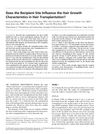
research Does the Recipient Site Influence the Hair Growth Characteristics in Hair Transplantation?
The place where hair is transplanted can affect its growth and survival rates.
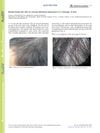
research Banded Scalp Hair with an Unusual Glistening Appearance in a Teenager: A Quiz
A teenager's hair with alternating white and dark bands, known as Pili annulati, is a genetic condition that is usually harmless and often considered attractive.

research Heterozygous 21-Hydroxylase Deficiency as a Cause of Hyperandrogenism
A woman's hyperandrogenism was caused by a genetic mutation leading to non-classic adrenogenital syndrome.
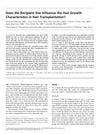
research Does the Recipient Site Influence Hair Growth Characteristics in Hair Transplantation?
The recipient site can affect the growth and survival of transplanted hair but not its thickness.

research Balding Hair Follicle Dermal Papilla Cells Contain Higher Levels of Androgen Receptors Than Those From Non-Balding Scalp
Cells from balding scalps have more androgen receptors than cells from non-balding scalps.

research Androgen-Inducible TGF-β1 from Balding Dermal Papilla Cells Inhibits Epithelial Cell Growth: A Clue to Understanding Paradoxical Effects of Androgen on Human Hair Growth
Androgens may cause hair loss by increasing TGF-beta1 from scalp cells, which inhibits hair cell growth.

research Androgen Actions on the Human Hair Follicle: Perspectives
Androgens have complex effects on hair growth, promoting it in some areas but causing hair loss in others, and our understanding of this is still evolving.

research Lichen Planopilaris: Chronic Scarring Alopecia with Autoimmune Component
Lichen planopilaris is a chronic, scarring hair loss condition with no definitive cure, requiring accurate diagnosis and treatment to manage symptoms.

research Drug Reactions Affecting Hair: Diagnosis
Some drugs can cause hair loss, change hair color and shape, or increase hair growth, and treatment may involve stopping the drug or using specific hair growth treatments.

research Keratinocyte Growth Inhibition Through the Modification of Wnt Signaling by Androgen in Balding Dermal Papilla Cells
Androgens slow hair growth by altering Wnt signaling in balding cells.
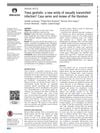
research Tinea Genitalis: A New Entity of Sexually Transmitted Infection? Case Series and Review of the Literature
Sexual activity can spread T. interdigitale, needing quick antifungal treatment to avoid permanent scarring.

research Hirsutism and the Variable Response of the Pilosebaceous Unit to Androgens
Different women's hair and skin glands respond to hormones in varied ways, which can cause unwanted hair growth even with normal hormone levels, and more research is needed to treat this effectively.

research Biology of Hair Growth
Testosterone and dihydrotestosterone affect hair growth, and new techniques like the folliculogram help study it, but fully understanding hair growth is still complex.

research Hair and Scalp Manifestations in Secondary Syphilis: Epidemiology, Clinical Features and Trichoscopy
Hair loss in secondary syphilis is more common than thought and can be reversed with antibiotics.

research Aging in Hair Follicle Stem Cells and Niche Microenvironment
Aging in hair follicle stem cells leads to hair graying, thinning, and loss.

research Antiandrogen Therapy for Skin and Hair Disease
Antiandrogen therapies are beneficial for treating skin and hair conditions related to androgen levels.

research Lack of Effect of Topical Finasteride Suggests an Endocrine Role for Dihydrotestosterone
Topical finasteride doesn't reduce DHT levels, hinting at an endocrine role in hair loss.

research Hair Disorders
The document explains different hair loss types and treatments, emphasizing diagnosis through examination and tests, and specific treatments for each condition.

research An Overview of Management of Drug-Induced Hair and Nail Disorders
Cooling the scalp may prevent hair loss from chemotherapy, hair often grows back after treatment, and nail issues usually improve after stopping the drug.

research Mild Cutaneous Manifestation in Two Young Women with Extraordinary Hyperandrogenemia
Two women with very high androgen levels had only slight skin issues, one due to a non-classical adrenal disorder and the other due to an adrenal tumor.

research Identification of a Recurrent Nonsense Mutation in HR Gene Responsible for Atrichia with Papular Lesions in Two Kashmiri Families
A mutation in the HR gene causes a rare form of irreversible hair loss in two Kashmiri families. Whole exome sequencing is effective for finding such mutations.

research Regional Dermatology: Hair and Nail Biology, Hair Loss Conditions, and Dermatological Issues of the Mouth and Genital Regions
The document explains hair and nail biology, common hair loss conditions and treatments, oral and genital skin diseases, and the risks and treatments associated with squamous cell carcinoma.

research Pseudopelade of Brocq: A Clinico-Therapeutic Challenge
Pseudopelade of Brocq is hard to diagnose and treat, with limited effective options.
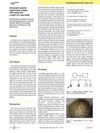
research Autosomal Recessive Hypotrichosis Simplex With Woolly Hair: A Report of a New Family
Two siblings were found to have a genetic condition causing progressive hair loss and woolly hair, which may often be misdiagnosed.

research Hair Disorders
The document concludes that accurate diagnosis and appropriate management are crucial for treating various hair disorders, which have significant psychological impacts.